When can I stop pumping at night? – This is a question that many moms who pump their breast milk have.
Pumping at night, in the beginning, is a must because you want to make sure you have enough milk for your baby.
With time, you’ve probably created a good milk supply, and your baby is sleeping more and more at night.
Because of that, you’re wondering – when can I stop pumping at night? You simply want to sleep more, and you want to create a more convenient atmosphere even when you have to get up.
There are some things you should know if you’re wondering when it is time to stop pumping at night. This article will be very helpful and you will know how to deal with this transition.
When Can I Stop Pumping At Night?
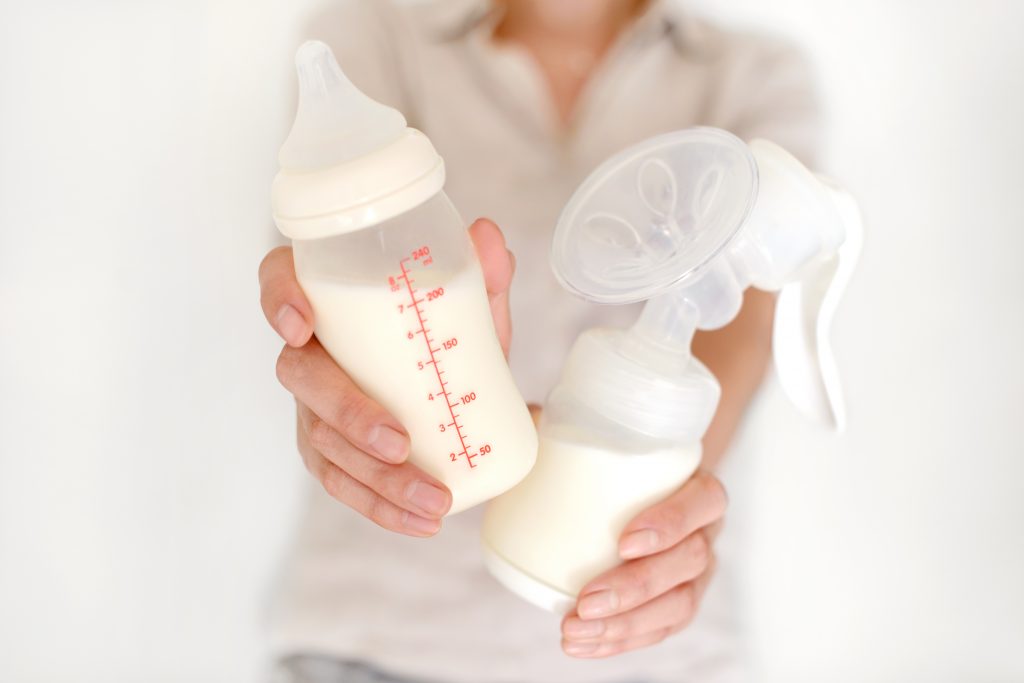
Before we get into tips and tricks that will help you to stop pumping at night, it’s important to answer your question – when can I stop pumping at night?
You can stop pumping at night when your baby doesn’t eat anymore during the night, or when you only have to feed your baby once.
When the baby is sleeping through the night, it’s time for you to sleep more too. That being said, this period of sleeping more is also the period when you can stop pumping at night.
You can also stop pumping at night when you have a good breast milk supply. Some moms have a lot of breast milk. If you’re able to pump enough milk for your child during the day, there is no need to pump at night.
Just store the milk properly and use it at night. The pumping session takes time, and when you wake up in the middle of the night, it’s great when you can finish everything faster.
Now that you have the answer to your question – when can I stop pumping at night, it’s time to learn more about this topic.
How To Stop Pumping At Night?
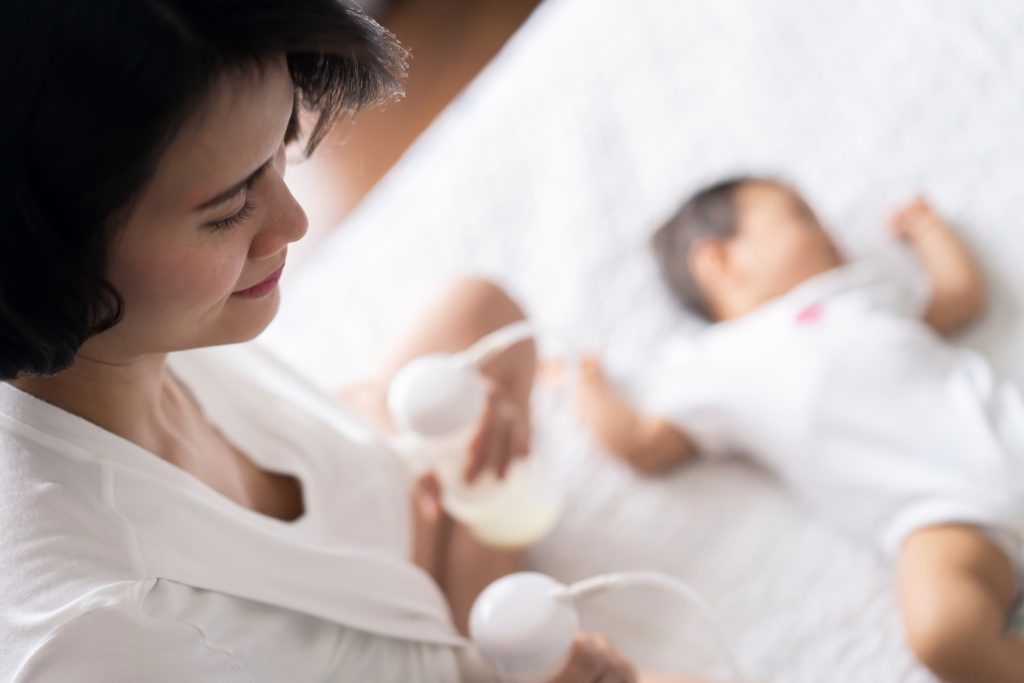
If you’re sure that it’s time to eliminate pumping at night, it’s time to learn how to stop pumping at night. Many mothers keep pumping at night even when their child is not nursing at night at all.
Their breasts are simply ready for a pumping session, and they feel uncomfortable so they have to extract that breast milk.
However, our bodies are amazing. It’s possible to train your body for everything. It’s possible to create a habit of pumping for your breasts.
If you want to know more about how to stop pumping at night, stay tuned.
You Have To Pump Right Before Going To Sleep
If you want to avoid painful breasts, pump your breast milk just before you to sleep. This will prolong your period of comfort.
Some women could go through the night, without having to get up and pump again.
A pumping session before bed is not the only thing that will help you train your body, but it’s the first thing you should do when trying to stop pumping at night.
You Shouldn’t Drain All Of You Breast Milk
If you’re wondering how often I should pump at night, remember that most women have to pump at least once a night even when they’ve pumped just before going to bed.
Your breasts become painful and sore when you don’t pump regularly. Pumping will help but don’t drain all of your milk.
When you want to stop pumping at night, you should only pump a little bit of milk, just so you don’t feel uncomfortable anymore.
In a few nights, your body will consider that amount of pumped milk a normal one, and you won’t feel uncomfortable anymore.
You Shouldn’t Pump For Too Long
The longer you pump – the more milk you’ll get. As I’ve mentioned you should only pump a little bit of breast milk when trying to stop pumping at night.
You should also have shorter pumping sessions at night. Don’t drain your breasts and don’t pump for too long.
This will also send a signal to your body to produce less milk at night. In a few days, you will have no need to pump at night and late-night pumping session will stay in the past.
Power Pumping
Power pumping is a method that is used to produce more breast milk. You might be wondering why would you use this method when trying to stop pumping at night.
But, power pumping should be used during the day. This will help you to create a substantial milk supply, so you don’t need to pump at night.
Power pumping is also called cluster pumping because it mimics the baby’s breastfeeding.
When your baby is attached to your breast longer, the more breast milk your body will produce. Breast milk production is a supply and demand system.
Power pumping is when you’re holding your breast pump for longer periods to motivate your body to produce more milk.
Of course, if you have enough milk even if you stop pumping at night, there is no need to incorporate this method. If you want to be sure that you have enough breast milk, power pumping is the way to go. So, how to power pump?
First, pump for 20 minutes, and then rest for ten minutes.
Then, pump for ten minutes, and rest for ten minutes.
Once again, pump for ten minutes, and that is one circle of power pumping.
If you have the time, you can repeat this process a few times, but this will be enough for now.
I suggest pumping both of your breasts. When it’s time for rest, pump the other breast. This is called taking turns and it will give you an even better breast milk supply.
It’s okay if you pump a few minutes longer or rest a few minutes longer. You don’t have to be precise when counting minutes.
Power pumping session should be done once a day to increase lactation and breast milk supply. This will give you enough breast milk to store, so you won’t have to pump at night to feed your little one.
Power pumping is a flexible method, meaning you can create your own pumping and resting schedule. I suggest doing it when your baby is sleeping or when someone else is taking care of your baby.
You need some time to learn how to power pump efficiently. Just like with everything else, your body will need a few days to respond to power-pumping sessions.
Don’t give up. Just like your body needs a few days to get used to not pumping at night, it also needs a few days to create more breast milk.
Painful Breasts
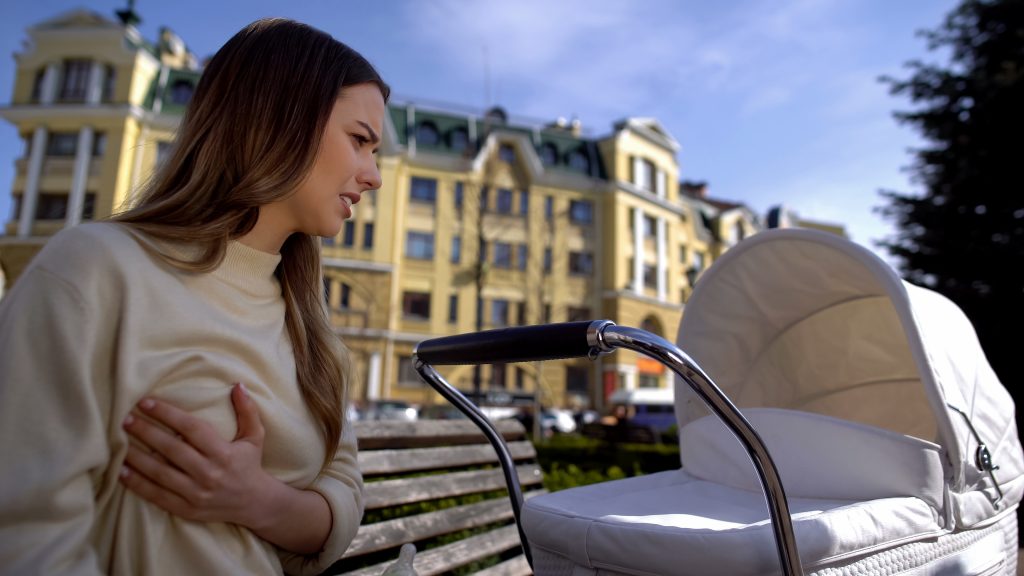
When your body is producing breast milk and you’re not extracting it by pumping or breastfeeding, your breast will hurt.
Sometimes that pain is just because your breasts are filled with milk that needs to go away. However, sometimes it could be the case of clogged milk ducts or mastitis.
If you feel better when you extract a little bit of milk at night, you shouldn’t be worried that something else is happening.
But, if your breasts are red and swollen, and you feel some lumps, even after you have your pumping session, this could mean there is something more serious happening.
Some women are simply prone to developing conditions like mastitis. Mastitis is an inflammation of breasts and nipples, and it’s often associated with infection.
This condition is very painful and it makes it hard to feed your child. It’s okay to feed your little one if you only have mastitis without infection.
If there is an infection, it’s essential to consult with your doctor. You will have to take antibiotics and the doctor will tell is it safe to feed your baby or not.
If there is no infection, I suggest pumping milk whenever you can until the mastitis goes away. Warm showers and gentle massages will also help. If you’re in a lot of pain, you can take some breastfeeding- safe painkillers.
This information could scare you and you might give up on the idea of not pumping at night.
However, if you follow all the steps mentioned above, you’re safe. You just have to adjust some things and in a few days, your breasts won’t expect any pumping or breastfeeding at night.
Clogged milk ducts are quite similar to mastitis, except it’s more localized. You will feel and see a lump on your breast. You should apply a warm compress and massage the lump to get rid of clogged ducts.
Just like with mastitis, try to have breastfeeding or pumping sessions whenever possible. When you resolve these issues, then you can start your routine to stop pumping at night and create a new pumping schedule.
As you can see, transition periods are difficult. If you want to stop pumping at night, it will be challenging.
You will have to be disciplined, patient, and determined. It might take some time, and it might cause some problems.
This is why it’s so hard to feed your baby with your breast milk. It’s the best food for them, but it comes with many struggles and challenges. Luckily, all of this will be over and you won’t remember it.
If you’re thinking that it’s time to drop pumping at night, you will probably think about how to stop pumping or breastfeeding for good soon.
These things come with painful, engorged breasts, and it’s good to know some home remedies that could help with this problem.
Warm Bath
Even if you don’t have mastitis or a clogged breast milk duct, a warm bath or a warm compress will help you.
Most people think that using a cold compress or ice is the way to go, but in this case, warmness is much more helpful for you.
Using A Breast Pump
When you want to eliminate pumping at night or pumping at all, it seems like a wrong decision to extract milk from breasts.
However, draining a small amount will make everything easier.
Massage
Massaging painful areas of your body is always beneficial. This also applies to painful breasts.
A gentle massage will take away the pain. Massaging your breasts while taking a warm shower is even better because it will give you relief.
Cold Packs
Even though a warm compress and a warm shower is better, sometimes the pain is so strong that you have to cool down the area for a while.
Use some cold packs or cold compress until you feel numbness in the chest area. This will help you with strong pain.
Drinking Enough Water And Eating Well
Many women struggle with fever, headache, and other things when they try to change their pumping or breastfeeding routines. This is why it’s important to eat healthy food and drink plenty of water.
You have to protect yourself from dehydration and other possible symptoms.
Using Pain Medications
You probably know which medications are safe to use while breastfeeding or pumping. If you don’t know, call your doctor.
The pain won’t last forever, but it’s okay to take some painkillers to feel better. Sometimes the pain can affect your other responsibilities and it’s better to take some medications.
Sage Tea
Sage is one of the best postpartum herbs. It’s good for many things, but it’s also good when you have painful breasts.
Drinking sage tea will help you and if your breasts are red or swollen, you can even rinse them with sage tea.
Sleeping
Whenever you’re in pain, you have to sleep enough if you want to be stronger. It’s hard to sleep when you’re in pain and uncomfortable, but try to use some medications for pain or something to fall asleep.
Pumping And Breastfeeding
Many moms are only pumping breast milk, and they make their exclusively pumping schedules.
Some moms exclusively breastfeed, while others have their personal breastfeeding and pumping schedule.
Nobody can tell what a better option for you is. It’s never too late to start breastfeeding if you’re tired of exclusively pumping your milk.
It’s okay to quit breastfeeding and start exclusively pumping. It’s also convenient to breastfeed and pump at the same time.
Sometimes, breastfeeding hurts even with a good latch, and it’s easier to deal with this problem when you’re breast pumping.
You’re the one in control when pumping and for some women, having a pumping session is easier than having a breastfeeding session.
Some women have hectic schedules and it’s easier for them to pump their milk and feed their babies with a bottle. This is also convenient because other people can feed the baby too.
If you want to feed your little one breast milk even when you go back to work, breast pumping is your best friend, and creating a good pumping schedule is a must.
On the other hand, if you want to have that special bond with your baby without worrying about breast pumps and storing milk, good, old breastfeeding is your option.
Different medical conditions can also be the reason for choosing pumping or breastfeeding. The point is – both of these methods are great.
Your choice is what matters, and don’t listen to other people when they try to tell you what to do.
There is nothing wrong with exclusively pumping. There is nothing wrong with combining breast pumping sessions and breastfeeding sessions. You should choose what works for you.
Pumping can actually be very helpful for women who struggle with breast milk supply. It will send your body signals to produce more milk.
Consuming lactation drinks is also a good way to help yourself with your milk supply.
I wanted to tell you more about this because many moms who pump and use a bottle for feeding feel bad because they don’t breastfeed.
You should be happy that you were born in this era and that you can actually use a breast pump. You have so many things that can make your life easier, and you shouldn’t feel bad about your choices.
Conclusion
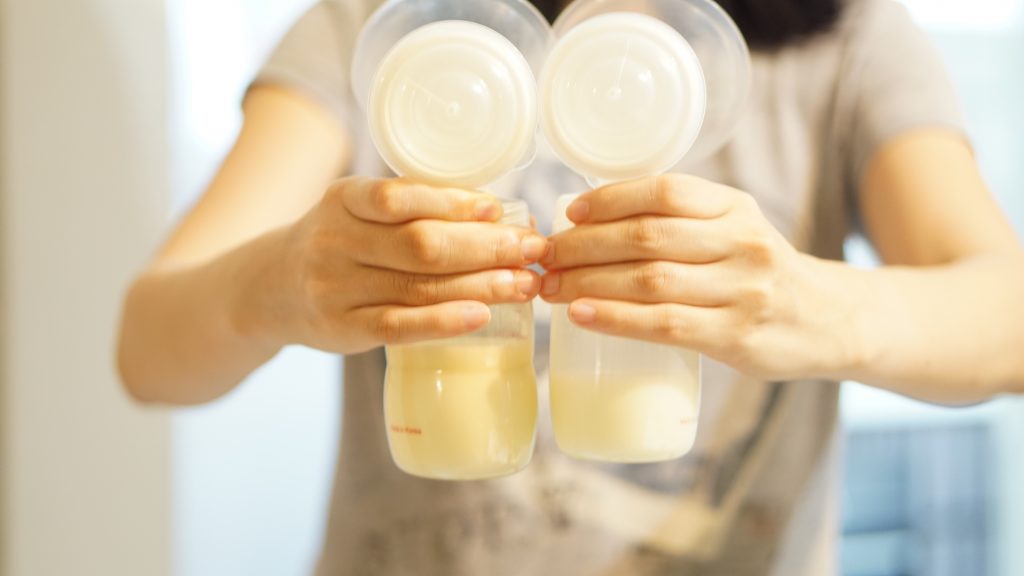
Most moms who are feeding their babies with their breast milk start to wonder when can I stop pumping at night, or when can I stop breastfeeding at night.
Babies grow, and their sleep schedules change. They start to eat other foods with time, and moms have to be flexible.
When you’re able to stop pumping at night, you will also be able to get some rest and sleep. This will benefit your body and you will finally start to feel better.
Every mom enjoys being a mom. It seems like nothing is too hard. But, moms are humans too. You deserve to be well-rested.
So, your motivation to stop pumping at night should be your baby’s changed sleep schedule and your own rest.
In the middle of the night, pumping can seem like the hardest thing to do. Your breast pump starts to look like some kind of enemy, and you start to realize that it’s a good idea to change some things.
Everything takes some time, and your patience and persistence are crucial when trying to change some routines and habits. Don’t give up too soon, because you will succeed.
Hi all, I am Sidney, an accountant, a hobbyist photographer, and a mother to two sweet girls who are my motivation. I love sharing the tips and tricks I gained all these years I’ve been a mother. I hope it will help you!


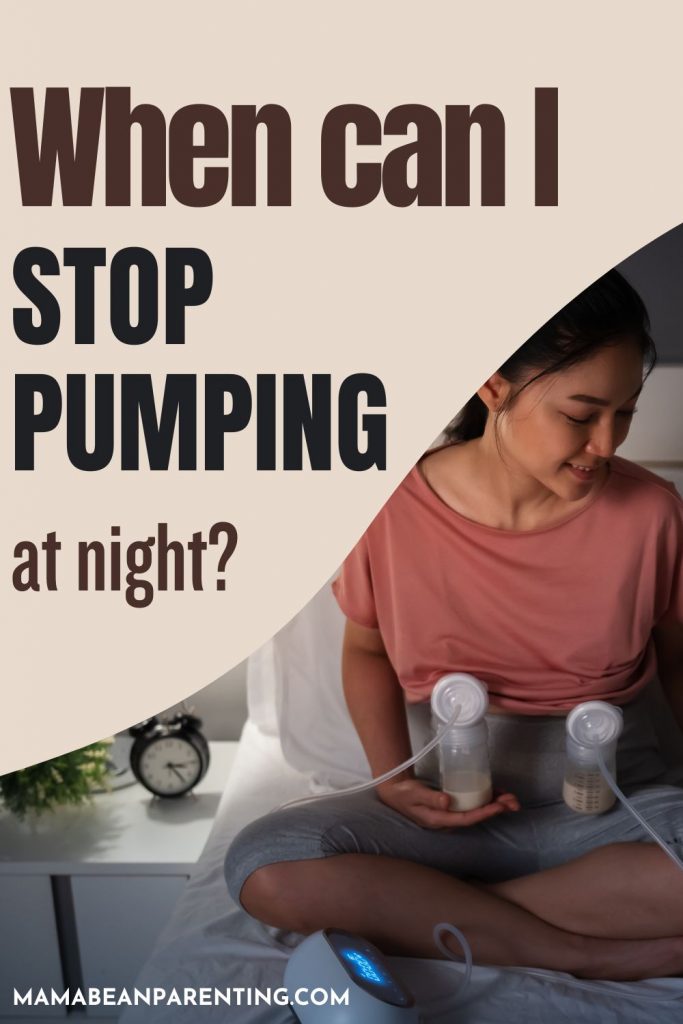
Breastfeeding Clicking Noise • Mama Bean Parenting
Wednesday 22nd of March 2023
[…] There are many reasons for breast swelling or engorgement. Maybe you have too much milk inside your breasts. This can happen if you’re trying to stop pumping at night. […]